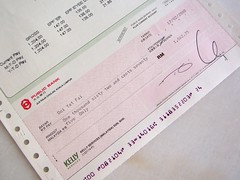What would your future-you have to say to you?
The no-pants guide to spending, saving, and thriving in the real world.
What would your future-you have to say to you?

For the last year or so, I haven’t been writing much, which feels weird. I used to write three timer per week. I’d write about saving money, investing, frugality, sometimes, relationships and parenting.
But that stopped. Why?
When I started this site, I was about $110,000 in debt, and just starting my journey out of it. A few months before, I was looking into bankruptcy, because I didn’t know how to get out of debt.
For years, the ways I saved money, cut corners, and earned extra money was fodder for this site. Everything I did was about saving money, earning money, and paying off debt.
Now? I’m about 2 months away from being completely debt-free. I paid my mortgage off last month, and have about $10,000 in credit card debt at the moment. I know, I paid that off backwards, but there are reasons. Reasons I’ll share another time.
4 years ago, I was essentially working 4 jobs. My day job, my gun training business, my internet marketing business, and my websites(including this one). I was working all of the time. It was necessary, but it’s a path to burnout. Then, I changed jobs a couple of times, nearly doubling my day job’s pay. My business partner got promoted out of a position that generated leads for one of our businesses, then had an accident that the other shared business on hold for a while.
Suddenly, I had free time and enough money coming in that I didn’t need to work all of the time. It was a crazy place to be after spending more than a decade pretending to be a workaholic just to keep my head above water. (Here’s a secret: I’m incredibly lazy. I’m just the busiest lazy man I know.) So I started pursuing hobbies.
Linda and I have been taking ballroom dancing lessons and are nearly to the point that competing is a real possibility.
I cleaned out my garage and assembled a decent wood shop, which is something I’ve wanted to do roughly forever.
I’ve been taking blacksmithing lessons with my teenage son.
I’ve been playing games with my kids, dating my wife, and simply enjoying my life.
This site?
Through all of that, I haven’t known what to write about.
“Dear audience, this month, I paid my bills, didn’t go on vacation, and bought a drill press.”
“Dear audience, my debt went down another $500 this month.”
“Dear audience, I didn’t buy a car I can’t afford this month. Again.”
Those aren’t good articles. Financially–while paying off debt is disturbingly exciting–my life is very repetitive. That’s the hardest part about paying off a lot of debt. It’s good, it’s necessary, it’s boring. My wins have been spaced out by several years lately, and I haven’t been creatively frugal. Screw frugal. If you can afford some conveniences and luxuries, frugal sucks.
Anything new happening in my world that would apply to this site would make it read like an accountant’s ledger book. $100,000 minus $1500 plus $10,000 minus $300, ad nauseum.
Instead of inflicting boring accountancy on you, I’ve been absent.
What next? Who knows. I enjoy writing. I enjoy writing here. I’ve started writing a novel.
What would you like to see here?

Life is all about trade-offs. You trade your time for a paycheck. Your trade your paycheck for food, rent, and security. Don’t get so obsessed with saving and security that you forget to live your life. There are many good reasons to put your savings on hold in order to really live. Here are five of them:
1. You have an adequate emergency fund. You will never hear me advise against an emergency fund. If you don’t have one, stop reading this and get one. Go. Without an emergency fund, your budget is a financial crisis waiting to happen. With an emergency fund, you can weather life’s speed-bumps without watching them become total train-wrecks.
2. Your retirement is on autopilot. You are not allowed to stop saving and investing for retirement. Ever. Assuming you have a traditionally scheduled career that involves you working until you hit 65 and deferring a huge chunk of living until then, your income will cease when you retire. Do you know how long you will live? Do you want to spend your retirement broke and bored? Are you relying on the responsible financial management of the federal government to make sure you will still get your Social Security? Invest in your retirement and get this investment on autopilot so you can stop worrying about it.
3. Your income is set. I don’t believe in the fairy tale of a company being loyal to its employees. The aren’t. However, if you have a stable-ish job, an in-demand career, and some side-income coming from alternate sources, your emergency fund can be enough to carry you through the low times. That’s what it’s there for.
4. You have dreams. If you’ve always wanted to travel the world, follow a band on your, volunteer extensively, or anything else, it’s time to do it. Don’t postpone your passion.
5. Deathbed regrets suck. Very few people lie on their deathbed lamenting the things they did. Regrets tend to be focused on opportunities missed, skipped, or indefinitely postponed. Do the things that are important to you before it’s too late to do them. Don’t abandon your future in favor of current pleasures, but don’t forget to live, now.
Do you have any other reasons to stop saving?
It’s not a secret that health care can be expensive. Many people pay two and three digit bills for their prescriptions. A visit to the doctor’s office can hurt the budget. Glasses cost hundreds of dollars? How can you cut this cost?
Drugs
If possible, go generic*. There is no difference between Trazorel and trazadone, aside from the cost. Wal-mart, Target, and many other stores offer common generic prescriptions for $4-5. When you are talking to your doctor, ask if there is an drug option that has an available generic. When you are talking to your pharmacist, ask if there is a generic alternative available.
Get the price match. The Cub Foods pharmacy near me matches the Target generic drug price, giving us $4 generics for the asking. This is often an unpublicized deal, so make sure you ask. If your pharmacy will not match nearby prices, consider going elsewhere.
See if there is a 90 day plan. Many insurance companies sponsor a 90 day prescription plan that gives you a 90 supply of drugs for the 60 costs as long as you are willing to accept the drugs by mail. For expensive prescriptions, this 33% discount can be a substantial savings.
Physician
Does your clinic offer online consultations with your doctor or nurses? Some clinics offer a chat or email option to talk to your doctor without requiring a visit that will add fees and copays to your expense sheet. Most clinics and hospitals have a free nurse line for basic questions, like “When is my baby‘s fever dangerous?” It’s a great chance to save some money. I know, from personal experience, that they won’t be shy if they feel you need to come in, but they generally won’t try to convince you to come in if aspirin will fix the problem.
Stay in-network. Check with your insurance company to make sure the doctor you want to see if in your network and therefore, available at the cheapest out-of-pocket price. If not, and you really want that doctor, ask your insurance company if they accept nominations for the network and ask your doctor if he’d be interested in being nominated.
Stay home for your cold. Don’t go to the doctor for every minor problem. The best remedy a doctor can give your for your cold will reduce it to a seven day malady. On the other hand, if you do nothing, it will go away in about a week. Why waste the money? This counts double for the emergency room and urgent care. Strep throat is not an emergency. Wait until morning and go to the clinic, paying the lower fees instead of the large ER costs. Make an appointment for a doctor visit, if possible. Urgent care is billed the same as a regular visit, but most insurance plans double or triple the copay for urgent care visits.
Cash Flow
A Health Savings Account(HSA) is a pre-tax account to save for qualifying medical expenses similar to a Flexible Savings Account(FSA). The main differences are that HSAs are only available for people with high-deductible insurance plans and do not have to be spent on medical expenses. Non-qualifying expenses move from pre-tax to post-tax, meaning you will be charged federal income tax for non-qualifying withdrawals. FSAs are “use it or lose it” plans. If you don’t use it, it will go away, usually at the end of the year. That makes December a great time to stock up on over-the-counter medicines and possibly replace your eyeglasses, as both of those are qualifying expenses. Find out if you have either option available. If you use either one, set aside a place to store every imaginable medical receipt, so you can be reimbursed. Make sure you understand the FSA-eligible expenses.
An Ounce of Prevention
Get routine checkups. The earlier you find a problem, the more options you have. This goes for everything from cancer screenings to blood tests. Get a physical every year and know what is happening with your body. We may be living in the future, but replacement parts are still hard to come by.
Maintain Your Health
It’s cheaper to be healthy. Eat right, exercise, quit smoking.
I enjoy a good meal. It’s one of my favorite things. I won’t cut rich foods out of my diet, so we reduced portions. Beyond the first few bites, the flavor isn’t nearly as enjoyable or even noticeable. There’s no more enjoyment for huge servings than small ones.
Get more exercise, even if it’s just a 2o minute walks twice a week parking on the far side of the parking lot, or taking the stairs instead of the elevator.
Vision
Go online. This one is worth a write-up all by itself. I have 6 pairs of prescription glasses–all varieties of frames and coatings–that have cost a grand total of about $150. There is no noticeable difference between my cheapies and the designer alternatives. While I work on the write-up, the best site to introduce you to the concept of online glasses is GlassyEyes. Reviews, coupons, and discount likes. They have step-by-step instructions on turning an intimidating idea into a simple and cheap solution to an expensive problem.
How do you save money on health care?
* There are no generics available on new drugs until the initial patent expires. This gives the pharmaceutical companies a change to recoup their research and development costs. Without this patent period, new private drug research would evaporate. Don’t hate the brand names, but don’t show undue loyalty.
Have you ever set a goal…and failed?
At some point, it happens to all of us. After all, our reach should exceed our grasp, right? That doesn’t make it easy to admit failure, or to correct it. Did you let a New Year’s resolution lapse, or slip off of a diet? Have you started shopping indiscriminately again, or stopped going to the gym?
It’s okay if you did, but it’s time to fix it.
How can you get back on track after failing a goal?
Just like when you first started towards your goal, you have to decide when you’re going to get back on board. If you can’t decide, just pick the beginning of the next month. A new beginning is a great time to tackle your new beginning.
You failed once. Accept it and move on. Past behaviors don’t have to be an indicator of future performance. Just do better this time.
Somebody has noticed that you aren’t on the wagon. Your coworkers are seeing you eating candy, or your spouse has noticed you buying things you don’t need. Talk to these people. Tell them you’re going to redo the things you’ve undone. You’ll change the world, but you have to start with yourself.
Unless I have seriously misjudged my audience, you are human. Humans sometimes make poor decisions. Being ashamed won’t help you, but take the opportunity to learn from the past. Do you know what caused you to fail? Are there triggers to your behavior that you can avoid this time around? When I quit smoking, I tried to avoid rush hour, because I smoked heavily while I drove and I wanted to avoid being in car for as long as possible, minimizing one of my triggers. What cause your lapse, and can you avoid it?
This one should be the most obvious, but the fact that it’s a problem means it’s not. Do whatever it takes to not make the same mistakes and uphold your goals. Don’t smoke. Don’t eat garbage. Exercise more. Whatever you’ve decided to do or not do, do it….or not.
Have you missed a goal? How have you picked it back up?